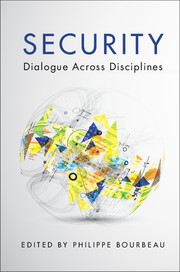Book contents
- Frontmatter
- Contents
- Notes on contributors
- Acknowledgments
- 1 A multidisciplinary dialogue on security
- 2 Philosophy: The concepts of security, fear, liberty, and the state
- 3 Anthropology/ies: Moving beyond disciplinary approaches to security
- 4 Geography: Securing places and spaces of securitization
- 5 Sociology: Security and insecurities
- 6 International relations: Celebrating eclectic dynamism in security studies
- 7 Psychology: The phenomenology of human security
- 8 International political economy: Conceptual affinities and substantive differences with security studies
- 9 Criminology: Reimagining Security
- 10 International law: Between legalism and securitization
- References
- Index
10 - International law: Between legalism and securitization
Published online by Cambridge University Press: 05 December 2015
- Frontmatter
- Contents
- Notes on contributors
- Acknowledgments
- 1 A multidisciplinary dialogue on security
- 2 Philosophy: The concepts of security, fear, liberty, and the state
- 3 Anthropology/ies: Moving beyond disciplinary approaches to security
- 4 Geography: Securing places and spaces of securitization
- 5 Sociology: Security and insecurities
- 6 International relations: Celebrating eclectic dynamism in security studies
- 7 Psychology: The phenomenology of human security
- 8 International political economy: Conceptual affinities and substantive differences with security studies
- 9 Criminology: Reimagining Security
- 10 International law: Between legalism and securitization
- References
- Index
Summary
Among international lawyers, questions about theory and research method tend to generate awkward silences. After all, for scholars of international law, “what passes as method … has to do with what counts as persuasive argument” because “international law is an argumentative practice” (Koskenniemi 2010). This is reflected in the dominant approaches to “security” in international law. While the concept is omnipresent in both positive international law and international legal scholarship, reflection on theories and research methods is only marginally developed. More theoretically oriented work on security in international law can mainly be found within specific “schools” that identify themselves as different from mainstream international legal scholarship, such as neo-Kelsenian approaches, critical legal studies, or third world approaches to international law.
In what may loosely be called “mainstream” international law scholarship, however, “security” is approached without much reflection on theory or method. Most books and articles on security in international law published in the past few decades focus almost exclusively on interpreting and applying existing law, sketching developments in international law, or suggesting how existing legal arrangements can be improved. Questions regarding epistemology, ontology, or the methods through which arguments obtain validity are largely left unconsidered.
Take, for example, the recent debates on the use of armed drones by the United States. Their use has been the topic of several reports of expert committees and special rapporteurs and given rise to a great number of articles and blog posts by legal scholars. So far, arguments about drone warfare and international law have predominantly revolved around the (in)compatibility of the use of armed drones with existing provisions of international law, combined with calls for more transparency to make such assessments possible. Leading questions are framed in terms of preexisting legal categories such as state consent, self-defense, armed conflict, legitimate military targets, and human rights protections. Practically no explicit consideration is given to questions regarding method or theory, apart from the invocation of the sources of international law. The international legal debate on armed drones is illustrative of the kind of knowledge questions that dominate the field of international law in general. In the vast majority of cases, the purposes of international legal research are to make sense of the world in terms of existing legal categories, to interpret and apply legal norms, and to suggest improvements or make policy recommendations.
- Type
- Chapter
- Information
- SecurityDialogue across Disciplines, pp. 196 - 218Publisher: Cambridge University PressPrint publication year: 2015
- 1
- Cited by

